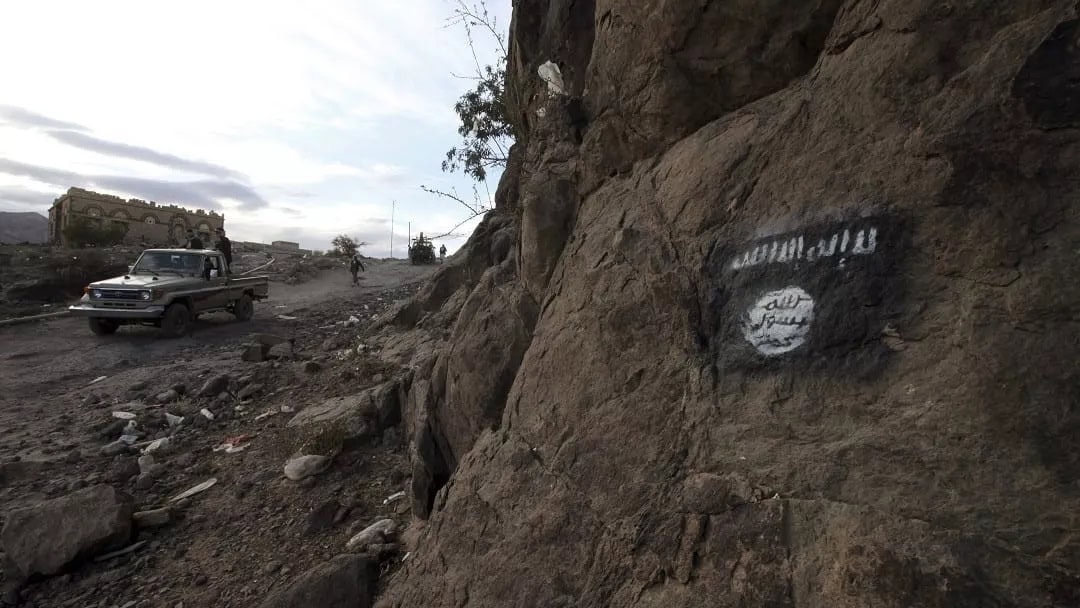
Shi'ite Houthi rebels drive a patrol truck past an Ansar al-Sharia flag painted on the side of a hill, along a road in Almnash, the main stronghold of Ansar al-Sharia, the local wing of Al Qaeda in the Arabian Peninsula (AQAP) in Rada, Yemen in this
آخر تحديث في: 08-11-2025 الساعة 8 مساءً بتوقيت عدن
|
|
Aden (South24 Center)
Al-Qaeda in the Arabian Peninsula (AQAP) called for attacks against the United Arab Emirates and Western interests, citing what it described as "Zionist-Arab crimes" in the city of Al-Fashir in Sudan's Darfur region.
The organization released the statement on Friday November 7, through its Al-Malahem media arm, using what analysts described as hostile religious mobilization language against the UAE and Western countries. It said that "supporting Muslims in Sudan" required targeting these countries' interests "everywhere.
The statement described the UAE as "the spearhead in the aggression against the Islamic nation," and attacked Arab governments allied with the West, calling on its followers to what it called "urgent movement for jihad."
A blurred image from AQAP statement.#south24 pic.twitter.com/IxmubmoVVr
— South24 | English (@South24E) November 8, 2025
While the statement did not include specific operational details, it reflects a clear escalation in the organization's rhetoric.
The threat comes amid rising international concern about expanding links between Yemen's Houthi movement and terrorist groups active in Yemen and the Horn of Africa.
A UN Panel of Experts on Yemen report submitted to the Security Council in mid-October revealed "growing coordination" between the Houthis, Al-Qaeda in the Arabian Peninsula, and Somalia's al-Shabaab movement.
The report said cooperation between these groups includes arms smuggling, sharing expertise on explosives and drones, and sending fighters for training in Houthi-controlled areas.
Read more at: UN Security Council Report Details Houthis’ Deepening Alliance with Terrorist Groups
The Houthi group benefits from these relationships in strengthening its military and economic influence, the report added. Al-Shabaab members have received training inside Yemen, while Houthi engineers traveled to Somalia to train the movement's fighters on modifying drones.
UN experts said this pattern of cooperation "goes beyond financial or logistical objectives" to reflect a broader regional strategy, posing a direct threat to maritime security in the Red Sea and the Horn of Africa.
Controversial Houthi statements have emerged that analysts say align with jihadist rhetoric. On Nov. 2, Houthi leader Mohammed al-Bukhiti wrote on social media platform X: "We are ready to ally with the Muslim Brotherhood to cut off the UAE's destructive hand in Yemen and Sudan... We are serious and ready, and we will not preempt events while waiting for a response."
These developments coincide with the emergence of a new group targeting South Yemen called the "National Armed Resistance," led by Amjad Khaled, a prominent wanted figure sentenced to death by an Aden court.
Khaled, a former officer who led the Transport Brigade under the Yemeni government, was sentenced to death in absentia by Aden's military court on charges related to assassinations and bombings against southern leaders.
Authorities accuse him of forming externally supported armed cells carrying out operations in Aden and Lahj.
One of his key aides, Nazih al-Azaibi, was arrested in late October in Mahra governorate while attempting to enter Yemen from Oman carrying large sums of money, a security source told the South24 Center.
Read more at: Top aide of Amjad Khaled’s Terror Cell Arrested at Yemen-Oman Border
Al-Qaeda in the Arabian Peninsula has repeatedly attacked the UAE, Southern Armed Forces, and the Southern Transitional Council through video releases and leaders' speeches, particularly since August 2022 when the organization suffered heavy losses in Operation "Arrows of the East" conducted by Southern Forces.
Al-Qaeda's statement also comes four days after a US drone strike that killed the senior security official in Al-Qaeda in Yemen, Abu Mohammed Al-Sanaani, in Wadi Ubaidah, east of Marib governorate, according to sources for South24 Center.
On October 26, Sudan's Rapid Support Forces announced their control of Al-Fashir city, the capital of the Darfur region, amid reports of violations committed against prisoners and civilians during the operations.
Later, the Rapid Support Forces acknowledged that violations occurred and said it formed committees to investigate and pledged to arrest those responsible.